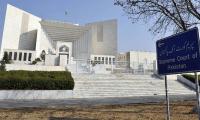A small number of us live within protected bubbles that keep us apart from the world outside. Those inside the bubble have access to luxuries of all kinds, including education for children, healthcare, luxury facilities at restaurants, malls, and so much more.
But outside this tiny percentage of the population, millions of people who make up the nation of Pakistan live beyond the bubble. One-third of the country’s population lives below the poverty line and are unable to feed themselves or their children. Others suffer at the hands of a healthcare system on which we spend just over one percent of our annual GDP and a public-sector education system that has failed the nation’s children terribly.
Pakistan spends just over two percent on education – well below the internationally-recommended figure of four percent. It is, therefore, not surprising that government schools are plagued with teacher absenteeism, corporal punishment, classrooms that are based outdoors on mud floors, and an extremely limited awareness about pedagogy in all our provinces.
Over 50 percent of children attending schools drop out by class five. This is either because secondary schools are located too far from their homes or because their conditions are too dismal. The booming madressah education sector, which has replaced this system, adds new dangers to society. Meanwhile, private schools tend to charge exorbitant fees at all tiers based on the group that they are catering to, with many still offering extremely poor levels of learning in terms of developing the minds of children or helping them build viable futures.
Partially as a result of all this, we have high rates of unemployment and underemployment, rising crime levels, a larger number of people who live without proper homes, and a situation where almost 50 percent of children in the country are stunted. Many children are even unable to achieve the expected level of mental development. In cities, those of us who live inside the bubble live in a constant state of fear from the ‘mob’ outside. We fear robbery, mugging attempts, petty theft from staff hired at often dismal wages and without any protections, and terrorists who have grown in number.
One day, the groups outside the bubble will attempt to break it down. They really have no choice. The human urge to live, eat and survive is strong. We have seen this through numerous eras in human history. The growing opulence of a few is witnessed by those who remain deprived of even the basic necessities of life.
Why, then, would they not try to gain some share of it? Surely it is only a matter of time before this happens – unless we, by some miracle, are able to drastically improve our governance system and offer huge subsidies on food items, education and other amenities that are urgently needed by the people.
There are occasional signs of attempts to crack open the glass bubble. For the second year in a row, students at the University of Peshawar protested massive increases in tuition costs, hostel charges and examination fees, which amounted to almost 400 percent over a decade in the case of some departments. Salaries have, of course, not risen at the same rate and students had every right to make their voices heard. Unfortunately, rather than hearing them and allowing them to penetrate the bubble – at least through their voices – they were bludgeoned and beaten by the police. For now, some kind of peace may have been restored on the campus. But in time, this will only ignite greater anger and fury among the frustrated people who have very few options left to them.
The answer, of course, is to think of the people first – especially those who have no protective wall of any kind around them, not even the fragile fortification that a mud wall can offer. Government policies have to change to make food a priority in a situation where infant and child mortality rates for Pakistan are now worse than those of all its South Asian neighbours and are similar to those of some countries in the resource-starved Sub-Saharan Africa.
At the same time, organisations working on food distribution have reported a 40 percent waste of cooked food in the country – mainly calculated from food wasted at marriage halls and hotels. This needs to change. A government that is willing to aspire towards this could achieve a great deal in a relatively short period of time. Soup kitchens, food banks and other means where people can at least escape starvation should be the first step. This would be a more welcome move than opening up the gates of governors’ houses or enforcing stricter laws on traffic and encroachments. The largest elements in the picture of misery need to be addressed first, even if this seems like a daunting task.
The reason why people haven’t rebelled is in itself a result of the lack of hope that they encounter in their daily lives. Our faltering history of governance has led many to believe that there cannot be change. The slogan of ‘Naya Pakistan’ had enlivened some. Without a doubt, many believed that the country would change almost instantly. Of course, this hasn’t happened. It cannot happen. But work can begin towards change immediately and some relief can be offered to those in great distress.
If we move in this direction, the bubble that people have used to protect themselves will finally be smashed. There are many signs of rising anger among the people, and strong perceptions of injustice and wrongdoing. We can sense this almost immediately in some areas within all our cities and in provinces such as Balochistan where a large number of people believe they have been wronged or cheated of what belongs to them.
Recent protests by the owners of CNG stations in Kohat against the increase in gas prices, which naturally affected their business, is an example of this. The victims of the Baldia factory fire of 2012 in Karachi continue to stage protests led by the brave mothers of young men who died in that terrible calamity. There has been no justice. The family of Mashal Khan, who was bludgeoned and shot to death by his own peers last year, raise their own voices whenever they can.
In Lahore, protest groups attempting to bring students together have been initiated by young activists who are dedicated to bringing change. Jibran Nasir’s decision to contest Election 2018, despite the small number of votes he collected, indicates that there are people looking to make a difference through various methods. At some point, they will come together.
Only excellence in governance can avert violence. There is already too much violence in the country, with people using guns to settle even the most trivial disputes. There are protests by traders, students, teachers, doctors, and other groups virtually every year. The anger in the country has to be channelled into something more positive. Only a government that is genuinely prepared to bring about real difference can succeed in calming down this rage and ensuring a safer future, not for those hidden inside their bubbles but for the entire population of a country that has fallen into immense disarray over the past few decades.
The writer is a freelance columnist and former newspaper editor.
Email: kamilahyat@hotmail.com
A health worker administers polio vaccine drops to a child during a door-to-door polio vaccination campaign in Lahore,...
Armed militants of the banned Tehreek-e-Taliban Pakistan pose for a photograph in Orakzai Agency. —...
An aeroplane of the national flag carrier of Pakistan is seen in this file photo. — AFPWhile Pakistan considers...
Representational image of a graph depicting various variables. — APP/FileInitiated by the centre and fiercely...
In this picture taken on April 16, 2023, people throng a market area during shopping in Lahore. — AFPOne of the...
Honour crimes also target men. In Sikandar Ali Lashari vs The State, SHC upheld conviction passed by ATC for honour...







